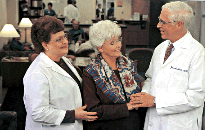Making Cancer History through Targeting and Partnering
 Dr. John Mendelsohn and Lorena Collier visit with patient Florence Aumont
of Coconut Creek, Florida, in the Nellie B. Connally Breast Center.
Dr. John Mendelsohn and Lorena Collier visit with patient Florence Aumont
of Coconut Creek, Florida, in the Nellie B. Connally Breast Center. Making Cancer History through Targeting and Partnering
 Dr. John Mendelsohn and Lorena Collier visit with patient Florence Aumont
of Coconut Creek, Florida, in the Nellie B. Connally Breast Center.
Dr. John Mendelsohn and Lorena Collier visit with patient Florence Aumont
of Coconut Creek, Florida, in the Nellie B. Connally Breast Center. Return to Winter 98